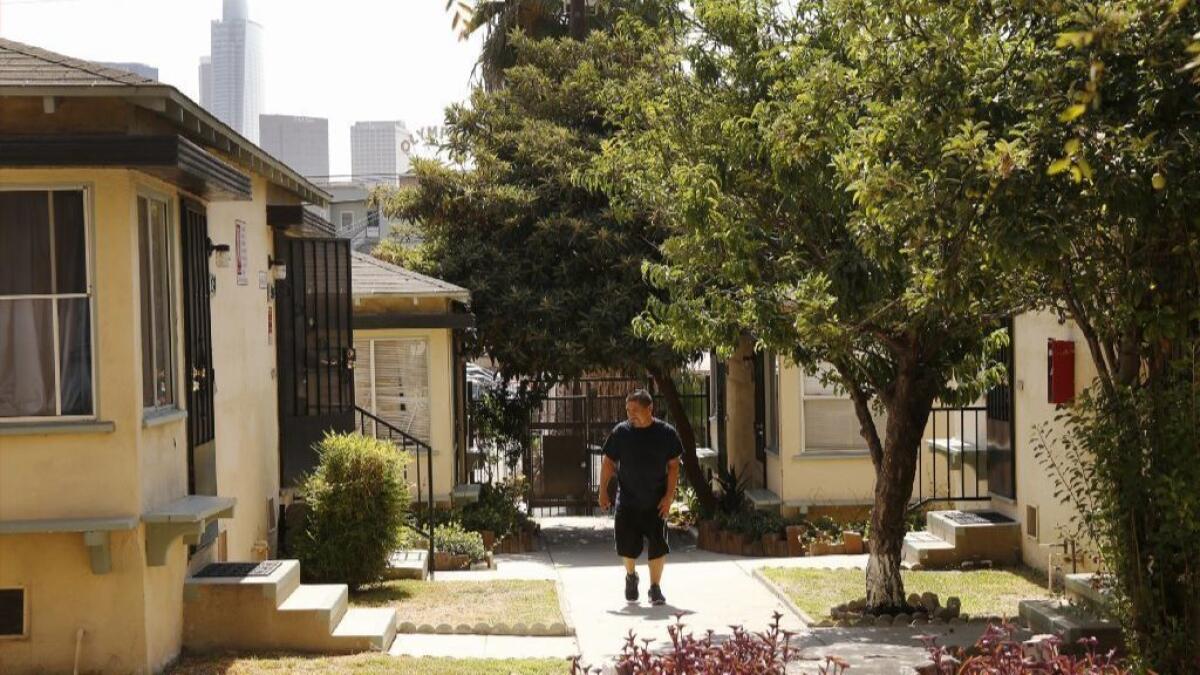Plan to demolish rent-controlled units for affordable housing in Westlake sparks backlash

Housing groups are criticizing a developer’s plan to displace dozens of residents from rent-controlled bungalows in the working-class neighborhood of Westlake to make way for a $64-million affordable housing project.
Nonprofit developer Abode Communities is seeking to build a 100-unit affordable housing project on Grand View Street, near MacArthur Park. The developer plans to demolish 36 rent-controlled apartments, where some residents pay less than $900 a month.
Abode is applying for public funds, including money from Proposition HHH, a voter-approved bond, to help pay for the new building, said Robin Hughes, chief executive of Abode Communities.
She described the development as having long-term benefits for a city grappling with rising rents and homelessness. The building would be deeded as affordable housing for the next 55 years, and in some cases, rents would be lower than what tenants now pay.
“Our overall goal is to increase the affordable housing stock in Los Angeles,” Hughes said. “We are strongly committed to work with the residents to make sure that they receive the relocation benefits that they are eligible for.
“I sympathize with the residents out there and I know there are concerns,” she added. “First and foremost, they will have the right to return to the development when it is complete.”
But at a news event Monday in front of the bungalows, community activists said some tenants may not be able to return if, for instance, their income levels disqualify them.
And if federal money is used in the development, residents who lack U.S. citizenship would be ineligible to live in the building because of federal funding requirements, activists said.
“We have a crisis of homelessness and affordability. You cannot solve that crisis by tearing down affordable housing,” said Michael Weinstein, president of the AIDS Healthcare Foundation, which focuses on healthcare and housing.
The taxpayer money proposed for the project is being squandered, he said, arguing that the $64-million price tag is too expensive.
Kassandra Reyes, 20, and her mother, Maria Reyes, 55, pay $880 for a one-bedroom unit and have lived in the bungalows for more than a decade. Kassandra Reyes said her mother works as a street vendor and doesn’t earn enough money to live in a more expensive neighborhood.
“It’s affordable for my mother,” said Kassandra Reyes. “This is our home.”
Larry Gross, executive director of the Coalition for Economic Survival, said affordable-housing developers are competing with market-rate developers for sites in the hot real estate market.
Abode is building what the city needs, which is more affordable housing, said Gross, who didn’t take part in Monday’s event.
“But the downside is that they’ve decided to build on existing affordable housing. We’re pitting one group of tenants against another,” he said. “It would be better if they found a commercial or vacant lot for their affordable housing project.”
Hughes defended the site’s location and said Abode is also looking to build on vacant sites. Given that Abode is applying for Proposition HHH funds, the developer is planning to set aside half the units at the new development for homeless people, she said.
Construction is expected to start in 2020 and end in 2022, she said.
Tenants in rent-controlled buildings have strong protections against eviction and are entitled to relocation assistance.
Under the state’s Ellis Act, landlords are able to evict tenants if they intend to take the housing off the rental market or demolish the building to put up new apartments.
As Los Angeles property owners cash in on the booming real estate market, an increasing number of rent-controlled buildings are being taken off the market. More than 24,000 rent-controlled units have been removed since 2001, according to the Coalition for Economic Survival.
Hughes said there were multiple offers on the Grand View Street property.
Activists Monday also criticized Abode for sending out a letter that stated that “all tenants” seeking relocation assistance must show proof of U.S. citizenship.
The letter, sent by a relocation company hired by Abode, goes on to state that some assistance is available to those without proof of residency.
Susan Hunter, a caseworker with the Los Angeles Tenants Union, said residents received the letters only in English, not Spanish, and accused Abode of purposefully misleading the tenants.
“They’re causing confusion,” said Hunter, who attended Monday’s event.
The letter has language “that we have to follow,” Hughes said. “And we probably could have done better in framing it in a more accessible way.”
Abode also faced criticism in 2016 from tenants living in a South L.A. complex, who accused the developer of misleading them about the relocation process.
Twitter: @dakotacdsmith
More to Read
Sign up for Essential California
The most important California stories and recommendations in your inbox every morning.
You may occasionally receive promotional content from the Los Angeles Times.











